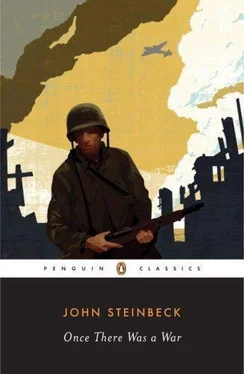John Steinbeck - Once there was a war
Здесь есть возможность читать онлайн «John Steinbeck - Once there was a war» весь текст электронной книги совершенно бесплатно (целиком полную версию без сокращений). В некоторых случаях можно слушать аудио, скачать через торрент в формате fb2 и присутствует краткое содержание. Город: New York, Год выпуска: 1960, Издательство: Bantam Books, Жанр: Классическая проза, на английском языке. Описание произведения, (предисловие) а так же отзывы посетителей доступны на портале библиотеки ЛибКат.
- Название:Once there was a war
- Автор:
- Издательство:Bantam Books
- Жанр:
- Год:1960
- Город:New York
- ISBN:нет данных
- Рейтинг книги:3 / 5. Голосов: 1
-
Избранное:Добавить в избранное
- Отзывы:
-
Ваша оценка:
- 60
- 1
- 2
- 3
- 4
- 5
Once there was a war: краткое содержание, описание и аннотация
Предлагаем к чтению аннотацию, описание, краткое содержание или предисловие (зависит от того, что написал сам автор книги «Once there was a war»). Если вы не нашли необходимую информацию о книге — напишите в комментариях, мы постараемся отыскать её.
Once there was a war — читать онлайн бесплатно полную книгу (весь текст) целиком
Ниже представлен текст книги, разбитый по страницам. Система сохранения места последней прочитанной страницы, позволяет с удобством читать онлайн бесплатно книгу «Once there was a war», без необходимости каждый раз заново искать на чём Вы остановились. Поставьте закладку, и сможете в любой момент перейти на страницу, на которой закончили чтение.
Интервал:
Закладка:
The tail gunner still hasn’t found his medallion. He has gone through his pockets over and over again. The brutal talk goes on until one voice says, “For God’s sake shut up. It’s after midnight. We’ve got to get some sleep.”
The lights are turned out. It is pitch black in the room, for the blackout curtains are drawn tight. A man speaks in the darkness. “I wish I was in that ship by now.” He knows that he will be all right when the mission starts. It’s this time of waiting that hurts, and tonight it has been particularly bad.
It is quiet in the room, and then there is a step, and then a great clatter. A new arrival trying to get to his bunk in the dark has stumbled over the gun rack. The room breaks into loud curses. Everyone curses the new arrival. They tell him where he came from and where they hope he will go. It is a fine, noisy outburst, and the tension goes out of the room. The evil thing has gone.
You are conscious, lying in your bunk, of a droning sound that goes on and on. It is the Royal Air Force going out for the night bombing again. There must be hundreds of them — a big raid. The sound has been going on all evening and it goes on for another hour. Hundreds of Lancasters, with hundreds of tons of bombs. And, when they come back, you will go out.
You cannot call the things that happen to bombing crews superstition. Tension and altitude do strange things to a man. At 30,000 feet, the body is living in a condition it was not born to withstand. A man is breathing oxygen from a tube and his eyes and ears are working in the reduced pressure. It is little wonder, then, that he sometimes sees things that are not there and does not see things that are there. Gunners have fired on their own ships and others have poured great bursts into empty air, thinking they saw a swastika. The senses are not trustworthy. And the sky is treacherous with flak. The flak bursts about you and sometimes the fragments come tearing through your ship. The fighters stab past you, flaring with their guns. And, if you happen to see little visions now and then, why, that’s bound to happen. And if on your intensified awareness, small incidents are built up with meanings, why, such things always happen under tension. Ghosts have always ridden through skies and if your body and nerves are strained with altitude, too, such things are bound to happen.
The barrack room is very silent. From a corner comes a light snore. Someone is talking in his sleep. First a sentence mumbled and then, “Helen, let’s go in the Ferris wheel now.”
There is secret sound from the far wall, and then a tiny clink of metal. The tail gunner is still feeling through his pockets for his medallion.
PREPARATION FOR A RAID
BOMBER STATION IN ENGLAND, July 1, 1943 —
In the barracks, a brilliant white light flashes on, jerking you out of sleep. A sharp voice says, “All right, get out of it! Briefing at three o’clock, stand-by at four-twenty. Better get out of it now.”
The crew struggles sleepily out of their bunks and into clothes. It is 2:30 a.m. There hasn’t been much sleep for anyone.
Outside the daylight is beginning to come. The crew gropes its way through sleepiness and the semidarkness to the guarded door, and each goes in as he is recognized by the guard.
Inside there are rows of benches in front of a large white screen, which fills one wall. Some of the crews are already seated. The lights go out and from a projector an aerial photograph is projected on the screen. It is remarkably clear. It shows streets and factories and a winding river, and docks and submarine pens. An Intelligence officer stands beside the screen and he holds a long pointer in his hand. He begins without preliminary. “Here is where you are going,” he says, and he names a German city.
“Now this squadron will come in from this direction,” the pointer traces the road, making a black shadow on the screen. The pointer stops at three long, narrow buildings, side by side. “This is your target. They make small engine parts here. Knock it out.” He mentions times and as he does a sergeant marks the times on a blackboard. “Standby at such a time, take-off at such a time. You will be over your target at such a time, and you should be back here by such a time.” It is all on the minute—5:52 and 9:43. The incredible job of getting so many ships to a given point at a given time means almost split-second timing.
The Intelligence officer continues: (Next three sentences cut by censor.) “Good luck and good hunting.” The lights flood on. The pictured city disappears. A chaplain comes to the front of the room. “All Catholics gather at the back of the room,” he says.
The crews straggle across the way to the mess hall and fill their plates and their cups, stewed fruit and scrambled eggs and bacon and cereal and coffee.
The Mary Ruth ’s crew is almost gay. It is a reaction to the bad time they had the night before. All of the tension is broken now, for there is work and flying to be done, not waiting. The tail gunner says, “If anything should happen today, I want to go on record that I had prunes for breakfast.”
They eat hurriedly and then file out, washing their dishes and cups in soapy water and then rinsing them in big caldrons near the door.
Dressing is a long and complicated business. The men strip to the skin. Next to their skins they put on long light woolen underwear. Over that they slip on what looks like long light-blue-colored underwear, but these are the heated suits. They come low on the ankles and far down on the wrists, and from the waists of these suits protrude electric plugs. The suit, between two layers of fabric, is threaded with electric wires which will carry heat when the plug is connected to the heat outlet on the ship. Over the heated suit goes the brown cover-all. Last come thick, fleece-lined heated boots and gloves which also have plugs for the heat unit. Next goes on the Mae West, the orange rubber life preserver, which can be inflated in a moment. Then comes the parachute with its heavy canvas straps over the shoulders and between the legs. And last the helmet with the throat speaker and the earphones attached. Plugged in to the intercommunications system, the man can now communicate with the rest of the crew no matter what noise is going on about him. During the process the men have got bigger and bigger as layer on layer of equipment is put on. They walk stiffly, like artificial men. The lean waist gunner is now a little chubby.
They dress very carefully, for an exposed place or a disconnected suit can cause a bad frostbite at 30,000 feet. It is dreadfully cold up there.
It is daylight now and a cold wind is blowing. The men go back to the armament room and pick up their guns. A truck is waiting for them. They stow the guns carefully on the floor and then stiffly hoist themselves in. The truck drives away along the deserted runway. It moves into a side runway. Now you can see the ships set here and there on the field. A little group of men is collected under the wings of each one.
“There she is,” the ball-turret man says. “I wonder if they got her nose repaired.” It was the Mary Ruth that got her nose smashed by cartridge cases from a ship ahead. The truck draws up right under the nose of the great ship. The crew piles out and each man lifts his gun down tenderly. They go into the ship. The guns must be mounted and carefully tested. Ammunition must be checked and the guns loaded. It all takes time. That’s why the men were awakened so long before the take-off time. A thousand things must be set before the take-off.
THE GROUND CREW
BOMBER STATION IN ENGLAND, July 2, 1493 —
The ground crew is still working over the Mary Ruth . Master Sergeant Pierce, of Oregon, is the crew chief. He has been long in the Army and he knows his engines. They say of him that he owns the Mary Ruth but he lends her to the skipper occasionally. If he says a flight is off, it is off. He has been checking the engines a good part of the night.
Читать дальшеИнтервал:
Закладка:
Похожие книги на «Once there was a war»
Представляем Вашему вниманию похожие книги на «Once there was a war» списком для выбора. Мы отобрали схожую по названию и смыслу литературу в надежде предоставить читателям больше вариантов отыскать новые, интересные, ещё непрочитанные произведения.
Обсуждение, отзывы о книге «Once there was a war» и просто собственные мнения читателей. Оставьте ваши комментарии, напишите, что Вы думаете о произведении, его смысле или главных героях. Укажите что конкретно понравилось, а что нет, и почему Вы так считаете.









